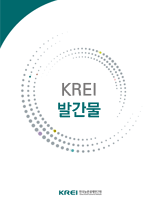요약문
이 연구의 목적은 농촌 지역개발사업 중 균특회계 계정에 속한 사업들을 중심으로 추진 현황을 파악하고, 몇 가지 기준에 의한 비교와 종합 평가를 함으로써, 체계화의 가능한 대안을 제시하는 것이다.
지역개발사업들은 각각의 근거법에 의해 추진되고 있으며, 사업의 공간 범위는 마을, 마을권, 읍·면, 읍·면 소재지, 시·군 일부지역 등으로 다양하다. 사업 내용은 표면적으로는 다양하게 보이지만 하드웨어 정비사업이 주를 이루고, 대체로 일반 농촌지역의 정주기반 확충사업, 낙후 농촌지역의 정주기반 확충사업, 도농교류 등 소득기반 조성사업, 기타 사업 등으로 구분 가능하다.
농촌 지역개발사업은 전반적으로 비슷한 성격의 사업들이 중복 추진되는 특성이 있으며, 그러다 보니 현장에서의 비효율성이 발생하고 있다. 또한 사업들은 농촌 정주공간 위계 및 부처 간 기능과는 무관하게 편의적 공간분할 형식으로 시행되어 사업 내용의 시의성 및 현장 적합성이 미약하다. 더욱이 기존에 낙후 농촌지역 관련 사업이 다수 시행되고 있음에도 불구하고 신활력지역 사업이 신설되었으며 상호 차별성이나 연계성이 모호하다.
농촌 지역개발사업은 지방의 자율성과 창의성을 담보할 수 있는 체계, 농촌지역의 정주공간 위계에 부응하는 사업 체계, 중앙정부 부처 간 미션과 기능을 고려한 역할 분담 체계를 구축한다는 원칙 하에 체계화될 필요가 있다. 체계화의 대안으로서는 첫째, 오지면과 정주권면 구분 해제, 둘째, 마을 단위 사업의 통합 추진, 셋째, 신활력지역 사업 추진 방식 및 내용의 차별성 확보, 넷째, 균특회계에서 제외하거나 포함시켜야 할 사업 재편, 끝으로 농촌계획 및 개발을 총괄하는 통합법 제정 등을 추진해야 할 것으로 판단한다.
The purpose of this study is to identify the progress of those rural development programs and projects that belong to the Balanced National Development special account, to systematically evaluate them against a number of carefully designed criteria, and finally, to suggest an alternative that will lead to the systematic reorganization and streamlining of various rural development programs and projects.
The raison d'etre of these programs is to enhance the quality of life in rural areas. This requires planners and policy-makers to work on a number of key factors in an effective manner. However, most of the programs in effect are principally targeted at the physical aspect, that is, designed only for the improvement and provision of physical facilities and infrastructure, ignoring other aspects. Even worse, programs and projects of similar and overlapping, if not same, goals and contents are competitively pushed forward by various ministries, subsequently causing inefficiencies and wastes. In addition, only for the reason of convenience, policy-makers divide up areas and regions, without paying sufficient attention to rural settlement networks and hierarchies, for the spatial designation of these programs and projects, thus causing irrelevance and insignificancy. Topping all these problems, newly created program of the so-called “New Dynamic Region” is not distinctive enough to differentiate itself from those programs and projects already existing, therefore revealing its dubious image of duplicating their goals and contents.
Rural development programs and projects can be consolidated and streamlined systematically under the principle that emphasizes, first, local autonomy and creative and entrepreneurial spirit, and secondly, proper role assignments among various, and sometimes competing, ministries, considering the relevance to rural conditions. For this, first, the separation of “Myon” administrative units of isolated areas and settlement areas must be nullified; second, programs and projects targeted at individual villages must be reevaluated, combined and consolidated; third, distinctive program contents must be secured for the “New Dynamic Region” program so that it can be clearly differentiated in its goals and contents from other rural development programs and projects; and finally, all the programs and projects must be reconsidered and reevaluated carefully whether to include in, or exclude from, the Balanced National Development special account so that only those programs and projects relevant in their goals and contents to the account will remain.
Researchers: Song, Mi-Ryung(mrsong@krei.re.kr)
and Park, Ju-Young
구매안내
KREI의 출판물은 판매 대행사 (정부간행물판매센터)와 아래 서점에서 구입 하실 수 있습니다.
판매대행사
- (주)정부간행물판매센터http://www.gpcbooks.co.kr사이트 바로가기
- 서울특별시 중구태평로 1가 25번지
- TEL 02) 394-0337, 734-6818
- FAX 02) 394-0339
판매서점


